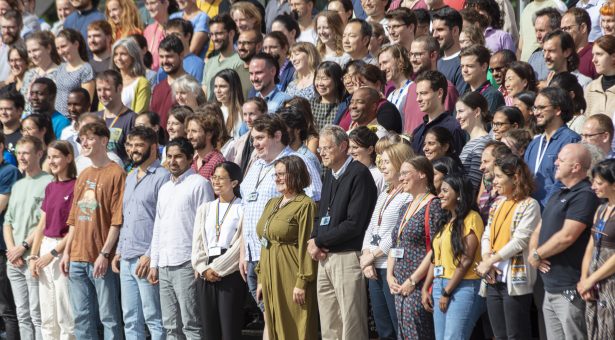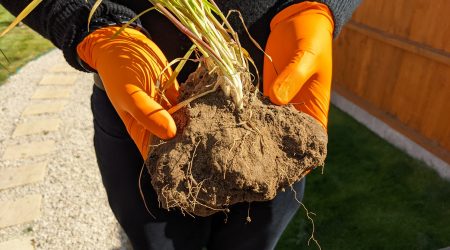£76.6m funding boost to world-leading research at John Innes Centre

The John Innes Centre today welcomes a major funding investment in its world-leading research and innovation programmes.
The funding from the Biotechnology and Biological Sciences Research Council (BBSRC), part of UKRI, is part of a £163.9m award made to three institutes based at Norwich Research Park, with Quadram Institute Bioscience receiving £55.9m and Earlham Institute £31.4m.
The 5-year investment announced today by the Department of Science, Innovation and Technology cements the region’s position as a world-leader in life science research, innovation, and training, particularly in plant science, food science, microbiology, and genomics.
The John Innes Centre receives funding for four strategic research programmes enabling research across plant and microbial science, from the unlocking of the remarkable and under-exploited biosynthetic capabilities of plants and microbes, through to the understanding and delivery of sustainable, resilient and robust high-yielding crops.
Professor Graham Moore, Director of the John Innes Centre said, “This welcome strategic investment will enable us to continue our research, and to invest in delivering solutions that contribute to a more secure and sustainable future. In particular, the challenges of transitioning to net-zero agriculture, improving public health and mitigating the effects of climate change on food security, are all nationally important priorities that the John Innes Centre, our partners at the Norwich Research Park and from across the UK, can have a real-world impact on, with our world-leading research and innovation.”
All four Institute Strategic Programmes, Delivering Sustainable Wheat, Building Robustness in Crops, Harnessing Biosynthesis for Sustainable Food and Health, and Advancing Plant Health, aim to build a more sustainable future through the power of plant and microbial science. They inform solutions to meet the era-defining challenges of feeding the world, combating global health threats and climate change. They will be delivered through partnerships or consortiums with other research institutes, universities or with industry collaborators.
As the UK’s major public funder of bioscience research and innovation, BBSRC is responsible for the long-term investment of substantial public funds in these strategically supported research institutes.
The funding for the three Norwich institutes is part of a wider investment from the BBSRC into their strategic research institutes and infrastructure across the UK totalling more than £376m between 2023-2028. The three institutes at Norwich Research Park have attracted more than 40% of the total investment announced today.
Professor Melanie Welham, Executive Chair at BBSRC, said: “BBSRC’s strategically supported institutes are a vital component of the national and international bioscience research and innovation ecosystem. As experts in their fields, these world-class research institutes provide the UK with the capability and connectivity needed to ensure the UK remains at the forefront of the bioscience revolution.
“The investment BBSRC is making in its strategically supported institutes over the next five years will help deliver novel bio-based solutions to some of the greatest challenges we face as a society.
“Bioscience shapes our lives in so many different ways and as the UK’s major public funder of bioscience research and innovation, it is mission critical that BBSRC invests in world-class science that delivers benefits to society as a whole while driving economic growth and prosperity across the UK and beyond.”
Roz Bird, CEO of Anglia Innovation Partnership LLP, the organisation that runs Norwich Research Park, said, “This is a massive boost for Norwich Research Park. As well as the clear benefits the funding will bring to the work undertaken by the three institutes, it also recognises the strategic importance and future role that all of us here at the Park can play.
“Our aim is to make this a hotbed for investors to spot opportunities to grow innovation that will ultimately deliver jobs, revenue and a vibrant future for Norfolk and the rest of the region.”
About the John Innes Centre Institute Strategic Programmes 2023 – 2028
Delivering Sustainable Wheat (DSW) aims to address critical challenges in wheat health, yield, and production in order to safeguard the future of this vital crop and brings together four research institutes – the John Innes Centre, Rothamsted Research, Quadram Institute, and Earlham Institute, plus the National Institute of Agricultural Botany, and the universities of Leeds, Nottingham, Lancaster, Bristol, and Imperial College London.
Advancing Plant Health (APH) aims to deliver new solutions to promote beneficial interactions and disease/pest resistance in crops of both national and global significance and integrates research expertise from the John Innes Centre and The Sainsbury Laboratory.
Harnessing Biosynthesis for Sustainable Food and Health (HBio) will unlock the remarkable and under-exploited biosynthetic capabilities of plants and microbes to make valuable new molecules to address global challenges of food security and human health.
Building Robustness in Crops (BRiC) will deliver genetic diversity and knowledge, innovative technologies and training to allow sustainable production of robust high-yielding crops including oilseed rape, pea, cereals and Brassica vegetables to identify and overcome key challenges caused by our changing climate.



